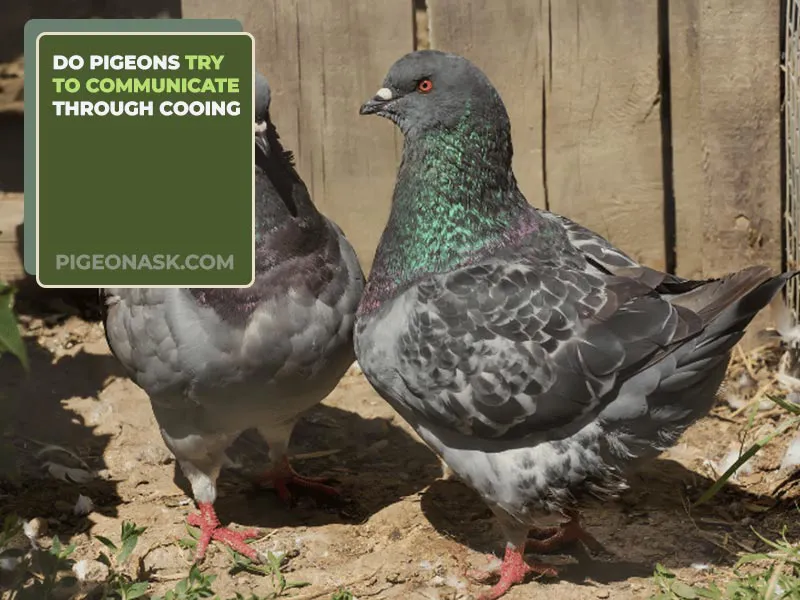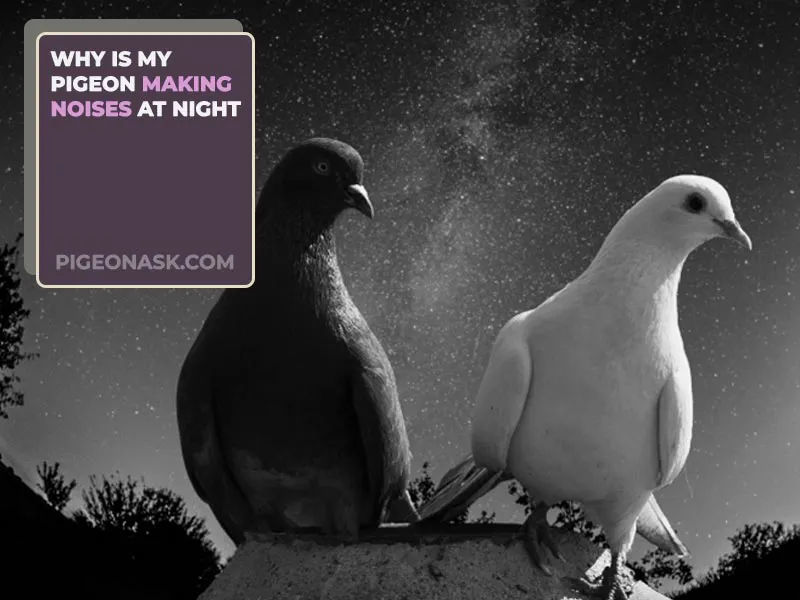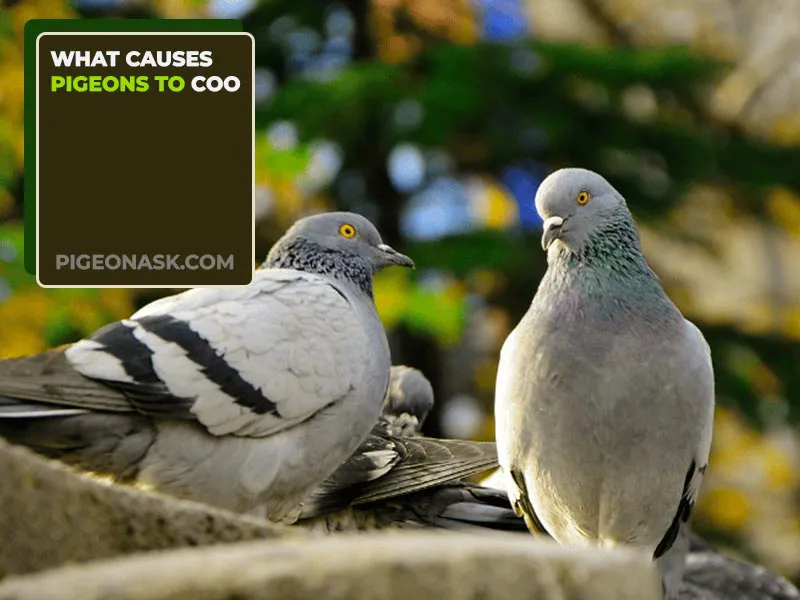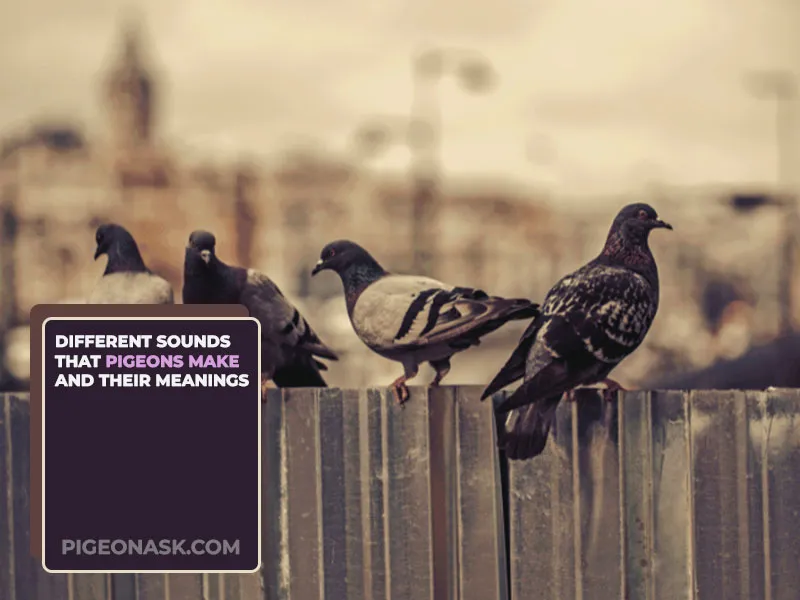Why Do Pigeons Coo At Night?
Like any other bird, pigeons have their own distinct calls. You will hear a lot of it while passing through the streets of urban areas in the morning and afternoon. In fact, you might even hear them cooing at night. And that might make you wonder, why do pigeons coo at night?
Pigeons are known to coo at all times. The time of the day does not matter. And at night, pigeons can coo to communicate with each other in the dark.
However, it is not just about communicating. There might be other reasons behind this. And if you want to know all about them, you would want to keep on reading.
Read more about pigeons behavior:
Do Pigeons Try to Communicate Through Cooing?
Cooing is a way of communication for pigeons. In fact, even baby pigeons, otherwise known as squabs, communicate with their parents when they need something. However, the coos of the squabs are not like the adults.

Instead, the squabs make squeaking sounds or whistles. Sometimes, you will even find them making hissing sounds. And the interesting part is that all these sounds have different meanings.
Why Is My Pigeon Making Noises at Night?
The noises that you are hearing are cooing. Pigeons are known for being active at all times of the day. And sometimes, they will even stay active throughout the night.
Now, whenever pigeons are active, they communicate with each other through cooing. While their calls are just simple sounds for us, the tone combined with the type of body language while cooing has meanings.

For example, pigeons can coo loudly when they see other pigeons in their territory. They can even chase after the intruder while cooing to establish their claim.
But, in general, the cooing you hear at night is basically pigeons talking with each other in the dark. And often, the pigeons can start a good conversation among themselves at night by cooing.
We have covered an in-depth article on “Pigeon Behavior“; if interested, you can check this article here.
Is It Normal for Pigeons to Coo at Night?
It is normal for the pigeons to coo both night and day. In fact, it would be abnormal for birds to not make sounds when they are active. Generally, they will not coo when they are ill or injured, stressed, or have problems in the vocal system.
Nonetheless, the main thing is that you should not worry about your pigeons cooing at night. It is a natural thing for them.
What Causes Pigeons to Coo?
Like us, pigeons make a sound to communicate with each other. And there can be various reasons why a pigeon coos. For example:

1. The Pigeon Is Trying to Attract a Mate
Cooing acts as a method of attracting a mate for these birds. You will often find male pigeons frequently cooing when they already don’t have a partner. Although the breeding season of pigeons is said to start in spring, they can breed year-round.
That means you can hear their mating calls throughout the year. That said, when males look for partners and coo, the females may coo in response.
2. Establishing or Maintaining a Territory
In case you didn’t know, some species of pigeons are known to be fierce when defending their territories. And when they are not fighting, these birds will use cooing as a way to establish and maintain their reign in the territory.
They can coo to signal to other pigeons that the area that they are wandering in is claimed. And this signal is usually the first warning that territorial pigeons will give before getting involved in a fight.
3. Signaling the Presence of Food
Pigeons are communal and gregarious. That means they will often stick with each other and find food together. And when they search for food, they can use cooing to signal the other bird about the presence of food.
After this signal, the other bird will come to the food instead of looking further. And they will eventually have the food together.
4. Expressing Fear or Stress
Like any other animal, pigeons can get stressed or feel fear. And when they do, they will express their feeling through cooing. Generally, the coo for feeling stressed or afraid will be different than the usual ones.
5. Socializing and Bonding with Other Birds
Pigeons are very social birds. They group together in large flocks and go on their days eating, flying, and playing together. And when they are socializing, they will typically coo at each other.
Different Sounds That Pigeons Make and Their Meanings
Not all the coos of pigeons are the same. Just like any other animal, they will make different sounds to express different meanings. Here are a few examples:

1. Grunting When They Are in Danger
When these birds sense trouble, they will start grunting. Pigeons can also use to signal other pigeons of potential danger. The grunts of these birds are usually short. And they will not drag it too much like a typical coo.
2. Hissing When a Predator Gets Too Close
Young pigeons, or squabs, will hiss when there are predators around. These younglings do not really have much to defend themselves. And by hissing, they let their parents know about the potential danger.
3. Whistling During Flight
These birds tend to whistle when they are about to take off. A typical takeoff will make them produce a soft whistle. However, if they are caught by surprise or there is danger nearby, the whistling will be very loud.
4. To Communicate with Each Other or Express Stress
Typical coos of pigeons can mean several things. It can be a mating call, or it could be a warning to the other pigeon that might be wandering in a claimed area.
However, these birds’ coo for expressing loneliness or stress is slightly different. You will feel a different tone in their vocal sound if they feel lonely or stressed. And if you have heard their coos for a while, you may be able to differentiate them.
Wrapping Up
To conclude, cooing is the primary way of communicating for pigeons. And they will communicate whenever they are active. So, if you are wondering why do pigeons coo at night, it’s because they are trying to communicate with each other.
Furthermore, it’s totally normal for pigeons to coo at night. Unless they are in danger or are expressing stress or anxiety, you should not worry about them making sounds when it gets dark.
Now that you know why pigeons make sounds at night, you might also want to know more about these birds. In that case, connect with us through our Facebook, Twitter, and Pinterest social accounts. Needless to say, we will make sure your timeline is blessed!
Article References:
- Prokill.co.uk/blog/why-do-pigeons-coo
- Gotpigeonsaz.com/blog/pigeon-cooing-is-more-than-just-annoying/
Image credits: Canva.com/photos
